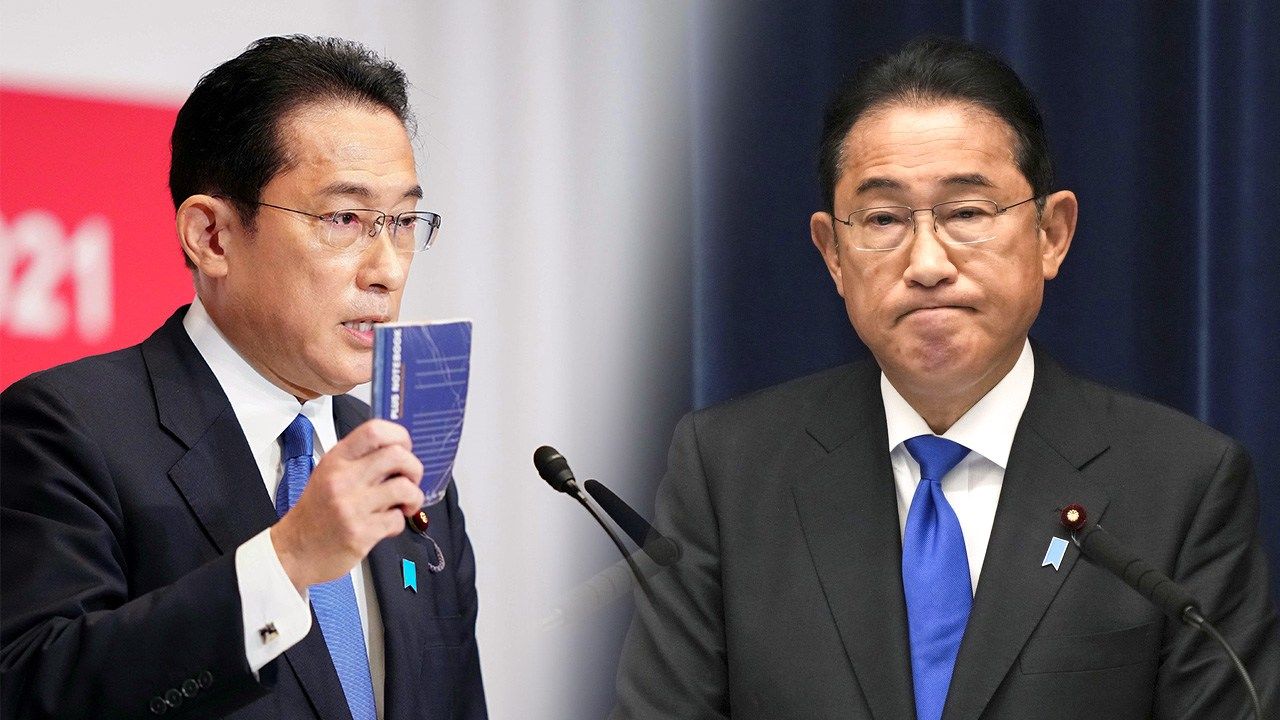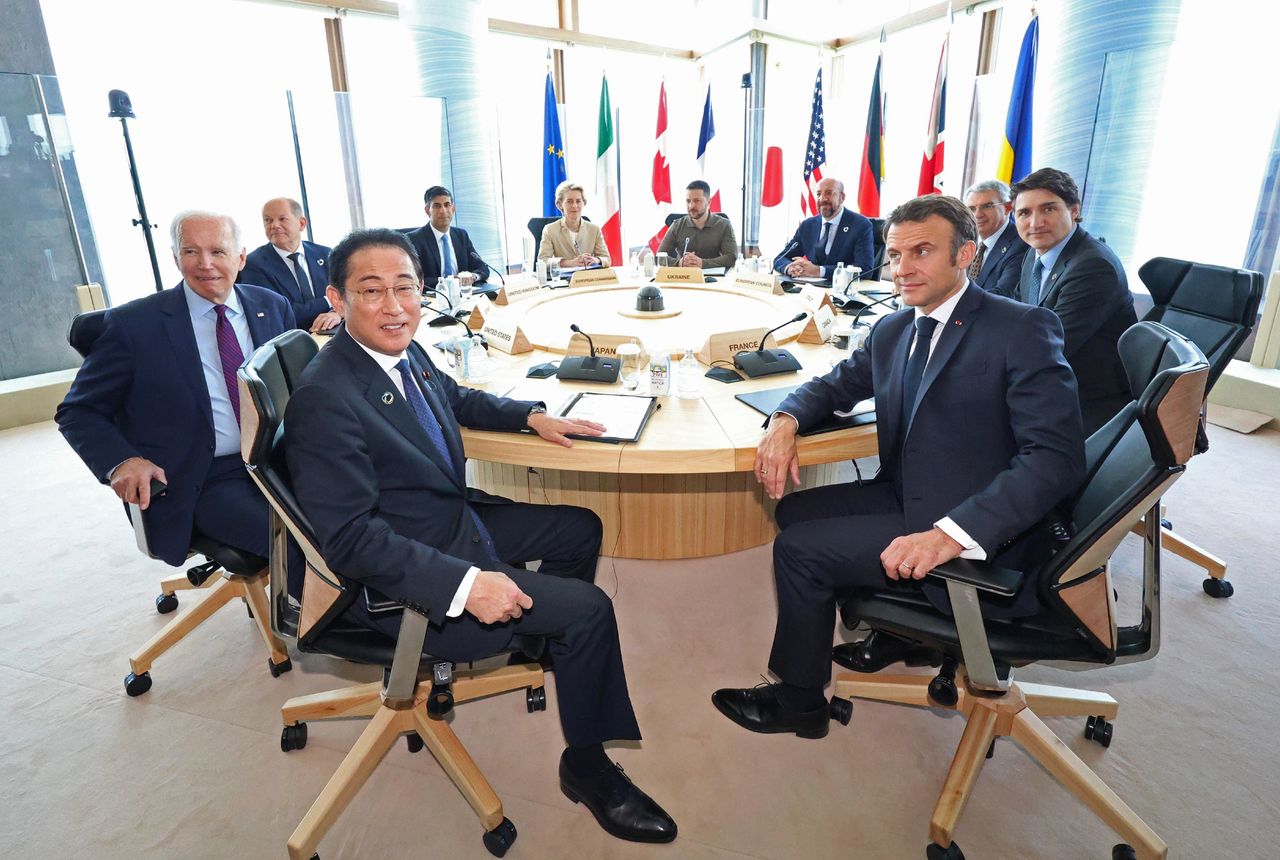
2024 LDP Presidential Election
A Brisk End to a Meandering Premiership for Kishida Fumio
Politics Society- English
- 日本語
- 简体字
- 繁體字
- Français
- Español
- العربية
- Русский
Mysterious Timing for a Major Announcement
At 11:30 on the morning of August 14, journalists gathered in Tokyo for a suddenly announced press conference at the Kantei. There, Prime Minister Kishida Fumio, in a surprisingly chipper voice, announced that he would not seek reelection as president of the Liberal Democratic Party in the contest that must be held in September this year. “To show the people that the LDP is changing, the clearest first step to take is for me to step down,” he explained.
On the surface, the denouement of Kishida’s term in office is similar to that of Prime Minister Suga Yoshihide (2020–21): a premier who could no longer stave off the cries from within his own party for his ouster, choosing to step down just ahead of the leadership contest. Cast aside by the electorate (Suga for his mishandling of the COVID-19 pandemic, Kishida for his half-hearted efforts to address the LDP’s political funding scandal), both of them also saw their support ratings plummet to all-time lows just before they left.
A difference appears, however, in the ways the two announced the ends of their terms. While Suga gave off an air of regret as he sketched out the shaky argument that he could not expend the considerable energy needed both to battle the pandemic and to run for LDP president once more, Kishida was straightforward: “I feel no hesitation whatsoever in taking responsibility as the head of our organization.”
When did Kishida arrive at his decision to step down? I recently spoke with one high-ranking government official who meets frequently with the prime minister. At that time he told me, “Kishida is definitely aiming to secure another term as the party head. When I talk with him, I can feel him brimming with that desire.” According to this official, Kishida was confident going into the LDP race that even if he went up against former party Secretary General Ishiba Shigeru, who consistently ranks highest in public opinion polls, he would be able to come out on top by promising not to dissolve the House of Representatives and call a snap election, thereby securing the all-important votes of the party’s Diet members.
At his press conference on June 21 this year marking the approaching end of the ordinary Diet session, Kishida suddenly announced a spate of new policies to be implemented during the summer and up through the period when the LDP election took place, including subsidies to households to help cover rising natural gas and electricity prices, as well as additional benefits to be paid to pensioners and low-income residents. Following the end of the legislative session, despite his bold statements about putting an end to the factions in the LDP, he was seen frequently meeting with members of what was previously the Kishida faction. Both of these developments indeed point to a prime minister eager to remain in that position. There must be an explanation for what transpired more recently to convince him to change his mind.
At his August 14 press conference, when asked about the timing of his decision, Kishida avoided a direct response, noting only: “Displaying my determination as a politician, I made this decision based on my need to step aside to restore public trust in the LDP.”
In his speech delivered before taking questions from the press, though, Kishida stated that he had been making up his mind since the political funds scandal first came to light, preparing himself mentally. If this is an honest recollection, then he had decided early on not to pursue another term as party head, but still played the part through his “determination as a politician.”
A Decision Reached Early On?
From another official close to Kishida, I heard a separate story about his decision not to run for LDP president this fall, based on his comments at the June 21 press conference. One journalist noted that the prime minister had appeared exhausted in Diet proceedings during the previous week, both in his facial expressions and his manner of speech, and asked whether he felt energetic at all.
To this, Kishida responded: “Well, if I come across as tired, I suppose that’s my own fault. I have plenty of energy, so I have no reason to tell you that I feel exhausted.”
It appeared as though Kishida were stressing his energy levels in this rebuttal, but the official I spoke to viewed the exchange differently. “Anyone who makes it to the prime minister’s desk knows that to show weakness means your time there is coming to an end. So when he said it was his ‘own fault’ that he looked tired, I felt certain that he saw the writing on the wall, and didn’t intend to extend his time in office.”
Toward the end of the ordinary session of the Diet, the conventional wisdom was that for Kishida to be reelected as LDP president, he would have to keep the party in power through the next general election. This led to strong expectations that he would dissolve the lower house, even at the cost of some LDP seats in the ensuing election, to establish this foundation for his next step forward. Just after his announcement this month that he would not seek reelection, though, when I asked the official close to the prime minister once again when he had decided not to extend his term, “sometime in early spring this year” was the reply. It may be time to recalibrate our conventional wisdom.
Kishida’s administration formed as a sort of antithesis to the authoritarian mold of the two it followed, those of Abe Shinzō (2012–20) and Suga. He made an impression with his appearance at a press conference three years ago, announcing his run for the LDP presidency with a notebook in hand he claimed was filled with comments he had collected from the people of Japan, a testament to his willingness to listen to the public.
A Perceived Lack of Political Ideals
In terms of policy, Kishida staked out a dovish position for himself on security issues, while favoring more balance in the budget on the fiscal front. In both these ways he differentiated himself from his predecessors, Abe and Suga. In particular, he sought to give himself a fresh policy face with his “new form of capitalism,” focusing on redistribution to revitalize a middle class hit hard by the growing economic divides of previous global capitalist trends.
The predictable outcome of this, though, was a backlash from some business leaders against what they decried as “socialism,” along with heightened alarm from the right-leaning members of his own party who had strongly supported Abe Shinzō’s “Abenomics” program. Kishida was pressed to alter his policy approaches, leading to the situation today, where no clear picture remains of the “new form of capitalism” he espoused.
In the realm of security, meanwhile, Russia’s invasion of Ukraine in February 2022 had a decisive impact on Kishida’s approaches. As the world rapidly shifted once again to a Cold War–style standoff, Kishida noted that “Today’s Ukraine could be tomorrow’s East Asia,” moving to increase Japan’s defense spending and equip Japanese forces with the capability to strike against enemy bases in times of threat as part of his amendments to key defense-related policy documents.
With respect to Japan’s defense spending in particular, Kishida has even indicated a willingness to depend on tax hikes to pay for part of Japan’s security burden, which he describes as “a responsibility for those of us living through these times.” This was in part a means of heading off members of the LDP’s Abe faction, who sought to pay for defense increases with further issuance of Japanese government bonds, but it was also evidence of his dedication to fiscal discipline, which he adhered to up through the end of 2022.

Kishida, at front left, saw a high point in his time as prime minister when he hosted the G7 summit in his hometown of Hiroshima. Taken on May 21, 2023. (© Jiji)
In January 2023, however, the prime minister seemed to change his stance, beginning with his “measures of a different dimension” to address Japan’s declining birth rate. These policies carried a significant price tag, but he was suddenly willing to put off discussion of how to pay for them until later. In autumn of the same year, he suddenly came out with his fixed-amount tax cut proposal as a way to “return increased tax revenues to the people.” With this, he was obviously taking a populist tack to fight back against the “four-eyed tax hiker” nickname the bespectacled premier had earned with his earlier approaches.
According to one senior bureaucrat I spoke with, the turning point was clear in Kishida’s administration. “At first, there was a clear tension in the air when it came to how we would fund the increased defense spending in his agenda. But once he started talking about his measures to prop up the birth rate, that seriousness was nowhere to be seen.”
In the end, Kishida’s administration will be characterized as one that spent much of its time confronting chaotic situations related to the Abe faction, the LDP’s largest: in 2022, the assassination of former Prime Minister Abe and his state funeral and the scandal of ties between LDP members and the Unification Church that exploded in the wake of his killing, and from late 2023 on, the unfolding kickbacks scandal that rocked the ruling party.
During this period, Kishida took the lead in implementing a range of measures in response, including a request for a dissolution order for the Unification Church, moves to disband the LDP’s factions, his own appearance before the House of Representatives Deliberative Council on Political Ethics, and his dramatic reduction of the amount triggering required disclosure of purchases of fundraising party tickets. But while each of these steps could be viewed as an improvement on the way things had been, none of them produced an uptick in popular support for his government.
The reason for this is that Kishida’s actions consistently came across as spur-of-the-moment, rather than being viewed by the public as evidence of his firmly held political ideals. The administration of Prime Minister Kishida Fumio can point to some significant accomplishments—an unwinding of Japan’s policy of monetary easing of a “different dimension” and a historic improvement in the country’s relations with its neighbor South Korea among them—but it will end next month still branded with the indelible mark of dismal public support.
(Originally written in Japanese. Banner image: At left, Kishida Fumio announces his candidacy for LDP president on September 17, 2021 [© Jiji]; at right, he announces on August 14, 2024, that he will not seek reelection as party head [© Kyōdō].)
